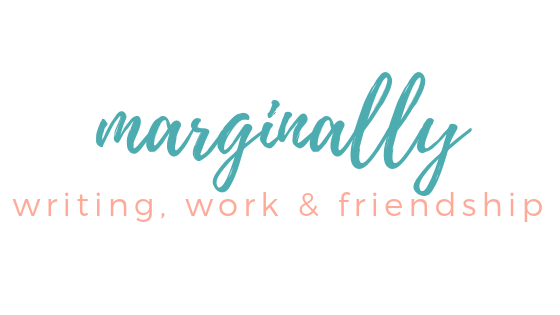Episode 103 is up, and we’re talking about You’ve Got Mail, as well as some big changes in our lives lately and how we’re handling them. Listen and check out the full show notes here, or in your favorite podcast app.
Episode 52 is here to share our big day job news
In Episode 52, we cover some great real-life stuff in a candid (read: very lightly edited) conversation.
We talk about the big day job news we were super shady about a month ago, and then we talk about how that’s changed our approach to our writing. We specifically like how making a big choice in your personal life can take away the pressure of making choices in your creative life – it’s weirdly freeing. And we talk about feeling like a writer when you’re too busy/sick to write much, and how the daydreaming and thinking about your novel is part of the novel, too.
You can find the episode and show notes here.
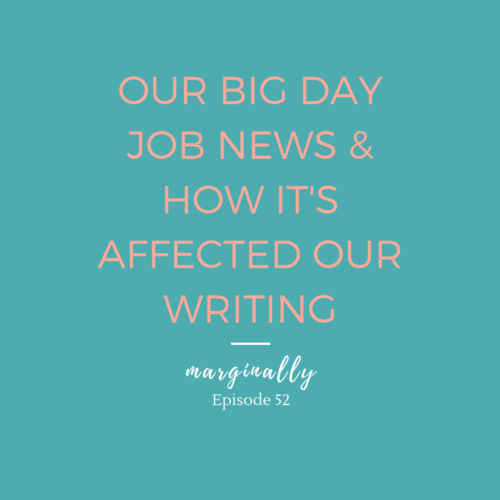
Episode 51 is all about growth
In today’s episode, we talk to Paul Jarvis, whose new book Company of One: Why Staying Small Is the Next Big Thing in Business is all about growing in a way that’s best for you and your audience. We love applying his lessons – like how to sell and market if you’re an introvert, and how to know if you’re just scared or something isn’t right – to the creative life.
The full show notes are here.
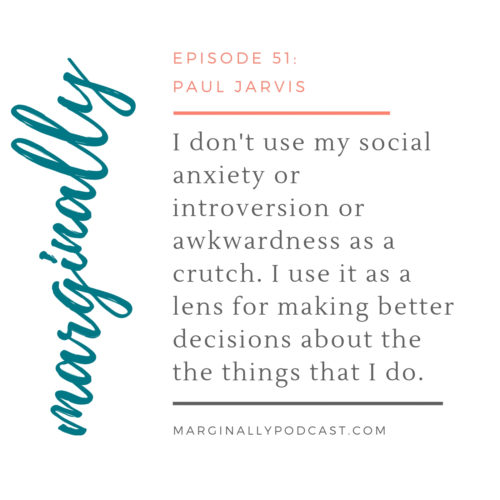
Episode 50 won’t tell you to quit or not quit your day job
Episode 50 is up, and we’re talking about the decision-making process for whether or not to quit your day job. Listen and check out the full show notes here, or in your favorite podcast app.
The July interview is up — an interview with Jean Hannah Edelstein
This month, we talk to writer Jean Hannah Edelstein — it’s an inspiring chat for margin-writers for sure, covering the glories of being an underachiever at your day job, the fact that rigid schedules aren’t for everyone, and how the reality of writing is sometimes you need another job for the health insurance. We also talk about how she found the confidence to give herself permission to take herself seriously as a writer, and how 11 years later, is seeing a big payoff.
Listen wherever you get your podcasts, or on the show notes page.
Episode 36 with #AmWriting host, Jess Lahey
We interviewed Jessica Lahey, a teacher, writer and co-host from the wonderful #AmWriting podcast. Jess talked us through how keeping her day job keeps her writing and ideas fresh, the difficulties of writing when she’s on the road on speaking tours. She gives some good tips on how to balance speaking gigs and freelance work, should you be looking to go that direction. And she has great advice on being kind to yourself and living a writing life, and the importance of writing friendships.
You can find Jess at jessicalahey.com, on her publisher Harper Collins’s site for The Gift of Failure here, on Twitter, on Instagram and on Facebook.
You can find her and KJ Dell’Antonia at their podcast #AmWriting’s on iTunes or on AudioBoom.
Get the show notes and listen here, or wherever you get your podcasts.
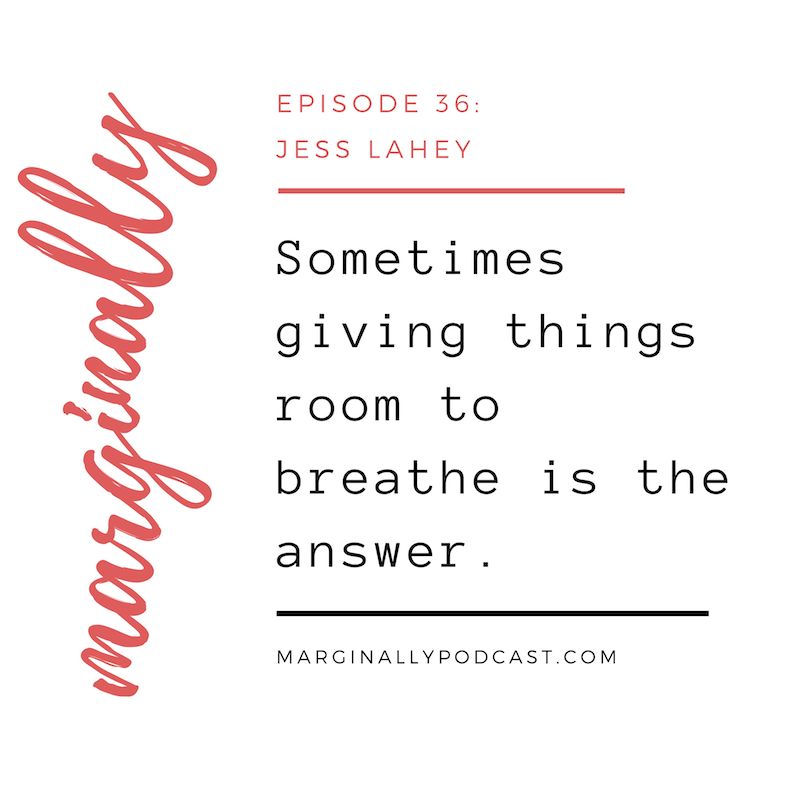
April round-up: You can do it, too
You probably already know from the podcast that I love my Google alerts. So good for keeping up with poets you like but can’t Google every day, and for keeping up with concepts you’re curious about. (My favorite Google alert is about head transplants. Read about it – it’s a thing.)
Anyway, I also have a series of alerts about writing and day jobs, and so we are starting a monthly round-up of stories of other people who are writing their books and getting published – all while not writing full-time. Read about them, and know that you can do it, too!
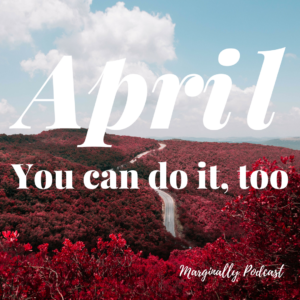
The April Round-Up:
Financial Times‘s profile of corporate workplace novelist and HR professional Jillian Medoff. She wrote on weekends and in the evenings. Her website is here, and her latest book, published earlier this year, is This Could Hurt.
The Observer published this profile of Hanya Yanagihara, who works as a journalist in her day job and published the critically acclaimed A Little Life a couple years ago. The interview and profile are engaging and fun to read, and she’s a big advocate of the day job:
In Yanagihara’s case, returning to the magazine world was a question of disposition and financial necessity. While a big seller by the standards of literary fiction, A Little Life was hardly Fifty Shades of Grey and Yanagihara lives in an apartment in downtown Manhattan with overheads that serious novels don’t support. It’s a stylish life and while she is dressed today in workman-like denim, an advertisement for the daylight-hours side of her nature, elsewhere whimsy reigns.
Canada’s Globe and Mail published this profile of lawyer and author of 8 books Catherine McKenzie. Her latest book is The Good Liar; her site is here. I enjoyed reading about the different genres she’s written in, and her overall path to being more confident in her writing. I also liked how they played on the “on the side” theme for this bio:
Instead, McKenzie’s Montreal fans learned that the novelist is a lawyer on the side. Or rather that, on the side of her 18-year legal career, which has taken her to the Supreme Court of Canada five times, she writes novels.
FemaleFirst.co.uk’s profile of the UK writer and former medical secretary Sheila Norton. She wrote her first 8 (of 18!) books in her spare time while working. Her latest book is The Pets at Primrose Cottage, and this is her website.
This roundup of young Australian authors has a good blurb on Shaun Prescott, a tech and gaming writer, as well as a novelist of the new book The Town.
In this profile in the Pacific Daily News, Michael Perez worked for decades in the Guam Department of Education, and has just published a book about an autistic girl, The Scream of Innocence.
This is a little out of tune with our “keep your day job” theme, but I still enjoyed this Guardian profile of the UK novelist Sarah Perry, whose The Essex Serpent has been really popular there and abroad in the past year. It starts strong, and keeps going well:
My first book was published when I was 34. I was at that time a copywriter, earning a living by removing errant apostrophes from clothing catalogues, and drafting news reports for legal journals. Before then, I had been a civil servant (a job to which I was ill-suited in every respect), a minimum-wage shop worker, a nanny, an office temp and a legal administrator. Often I am asked what possessed me to join the civil service straight after graduation, and the frank answer is that I had supported myself financially since I was 18, and needed to earn a living: writing, my long-held ambition, would have to wait.
… It never occurred to me that I would be able to make a living from writing fiction, and I did not in the least resent my day job, though naturally I occasionally imagined finding a hoard of Saxon gold in the back garden.
And, it turns out Agatha Christie worked as an apothecary. Which makes a lot of sense for her books.
Episode 33’s interview with poet and book publicist Abigail Welhouse reminds us that wanting attention is fine
In Episode 33, we sat down to talk to poet, book publicist and horseback riding instructor Abigail Welhouse, a great treat for April, which is National Poetry Month. Abigail is the author of Bad Baby (dancing girl press), Too Many Humans of New York (Bottlecap Press), and Memento Mori (a poem/comic collaboration with Evan Johnston), and works as a publicist at Scott Manning & Associates. She also works in a second day job for GallopNYC as a horseback riding instructor.
You can follow her by subscribing to her Secret Poems at tinyletter.com/welhouse, following her on Twitter (@welhouse), or check out her website at welhouse.nyc.
Full show notes and the episode are available here. You can also get Marginally on iTunes, Stitcher, Google Play, or wherever get your podcasts.
In Episode 31, we beg you not to quit your day job
In today’s very candid episode, we discuss something that’s been popping up online recently — our pet topic and the reason for this podcast: writers’ day jobs. We talk about the visible invisibility of writers’ day jobs — why writers have day jobs, and why don’t they talk about them? Let us know what you think.
To listen to the episode and for show notes, go here.
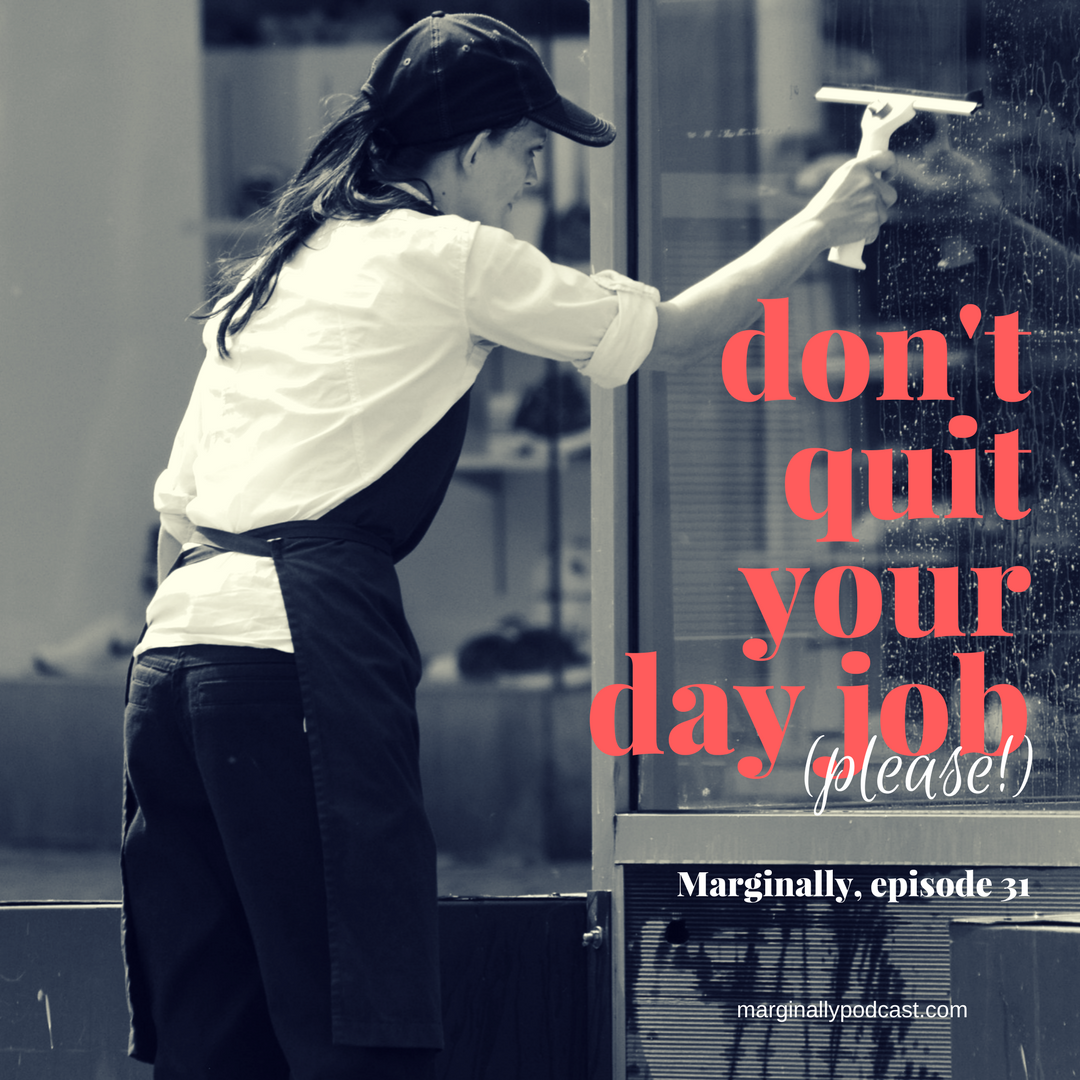
Do you write on your commute?
Yesterday I saw this article on TheMillions blog about Fiona Mozley, a writer with a 9-to-6 job who started writing her Man-Booker-Prize-finalist novel Elmet on her commute. I really liked this quote from her:
the sentences and paragraphs I wrote on my phone during my commute were very useful for keeping up the momentum. Sometimes when you’re writing–particularly if you’re working full time–you can have periods of writing nothing at all. Even if I found myself unable to write full sections, jotting ideas down on my phone meant that I felt a constant sense of progression.
I really liked this, and I liked her journey that she went on – from writing as an escape from a job and from a life that wasn’t working for her, to moving out of London and gradually building up confidence through part-time work. It is a good article just to get a sense of one writer’s journey.
I am not usually a commuter-writer; in my Eastern Europe city, I walk to work, and in London I was usually on a crowded Tube car. But I totally get the appeal – even apart from the obvious aspects that it’s just a chunk of time you can’t ever get back. I have done it a few times, when something was burning in my head, or when I just didn’t feel right and I needed to get it down. I have written a couple of really powerful scenes or parts of scenes in the Tube, and I always feel like I’m on fire, and like I have an important secret that is somehow also public (you’re surrounded by people, after all), and it does feel like magic.
As writers (and as podcast hosts!) sometimes we read the news about different writers’ routines to find out the magic formula, what can help us to finish our novel or inspire people. But when you really break it down, like this article does, it’s just about making small steps that turn into big leaps – and suddenly you’re writing a real book.
With Mozley, maybe if she’d thought about quitting her job to do a PhD when she first started, it would have sounded like too much, too hard (I don’t know, just speculating). But after she’s spent hours and days on this book, maybe it felt more possible – more and different things feel possible about writing once you start doing the actual writing when you can. Once you start working writing into your life, it also changes your life.
Writing on your commute, like writing during your lunch break or before or work or after work, is a signal that you’re taking yourself and your private, secret work seriously. And that can be hard when you’re working full-time, or when you’re caring for others full-time, or anything else you think you should pay more attention to than your own projects. But still we do it. We wake up early, or we huddle into our jackets and write away on a tiny notebook so no one can watch us on the train. We start typing ideas in our phones, or we try to type some sentences on the Tube or train.
It helps us to become who we are, and the practice of doing it helps us to find out who we are, too.
